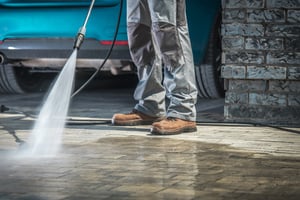 If you’re growing mold and mildew on your home’s siding, now’s a good time to clean it. If you’ve never done this before, you may not know where to start. Depending on the size of your home and the amount of debris on it, a simple garden house may not provide you with much help. A pressure washer and a scrub brush will do the trick.
If you’re growing mold and mildew on your home’s siding, now’s a good time to clean it. If you’ve never done this before, you may not know where to start. Depending on the size of your home and the amount of debris on it, a simple garden house may not provide you with much help. A pressure washer and a scrub brush will do the trick.
Before you start pressuring washing your home, there are some things to know.
Types of Pressure Washers
There are different types of pressure washers available. What you’ll use it for will help determine which one is right for you.
My first pressure washer was one I ordered from a TV shopping network. It was an electric one and seemed like a good deal at the time. Electric power washers are wallet friendly and portable making them easy to move around your home. The downside to them is they’re not as powerful.
Gas pressure washers are more powerful but are more expensive. With proper maintenance, they tend to last longer. Gas pressure washers can be used for tougher, larger jobs.
What are PSI and GPM?
Not all power washers are created equal. You’ll need to understand pounds per square inch (PSI) and gallons per minute (GPM) to select the right pressure washer for the job. PSI is the amount of cleaning power or force produced by the machine. GPM is how much water will go through the machine. To compare different power washers and to find the right one for you, multiply PSI by GPM or refer to the table below.
| Performance Type | PSI | GPM | Job Type |
| Light-Duty | 1,300-1,900 | 2 | Washing patio furniture, grills, and vehicles |
| Medium-Duty | 2,000-2,800 | 2-3 | Cleaning exterior siding, fences, sidewalks, and driveways |
| Heavy-Duty | 2,800 | 3-4 | Completing large-scale cleaning projects |
| Extra Heavy-Duty | 3,100 | 3-4 | Stripping paint, removing graffiti, and washing two-story homes |
Pressure Washing Tips
1. Be smart and safe. Wear proper eye and ear protection when working on your project. Always make sure you’re on stable to ground to prevent slip and falls. Never stand on a ladder.
2. Use tarps. Cover your plants, flowers, and other personal belongings to prevent damage.
3. Never point the spray gun at pets or people. I know it may be tempting and seem like fun to spray your spouse or sibling, but the spray gun isn’t a squirt gun. The high-pressure spray can cause significant bodily injury.
4. Turn it off. If you need to leave the job for any reason, turn off the pressure washer. You don’t want a small child or inexperienced person wielding the spray gun.
5. Select the correct nozzle for the job. Depending on your job, a different nozzle or tip may be needed. Nozzles/tips are made to draw the detergent out or to provide a high-pressure rinse. Some manufactures will color code the tips which signify varying angles. If yours has this, refer to your owner’s manual for more information.
6. Use appropriate chemicals. Only use approved chemicals or cleaning agents. Using the wrong one could damage your pressure washer and be harmful to the environment.
7. Develop a cleaning plan. Determine what you want to clean and if it’s safe to be cleaned with a pressure washer before starting. Otherwise, you may get ambitious and clean things that shouldn’t be, resulting in damage.
8. Maintain an appropriate distance. Spraying too close to an object can cause damage. Maintain a distance of at least four to six feet.
Do you have any tips or information you’d like to share? I’d love to hear them. Please share them in the box below.
Source:
https://www.lowes.com/n/buying-guide/pressure-washer-buying-guide





